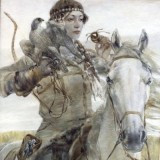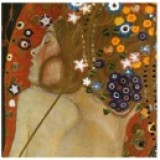Life of a Poet #1 - Robert Frost
-
silvershoes
15 years agoI'm starting this up, I hope no one minds :)
For one week we'll be discussing Robert Frost and we can whittle the "constructs of the idea" (rules?) as we go.
I'll begin with my favorite Robert Frost poem - a poem written in 1916 as part of the "Mountain Interval." I'm sure many of you are familiar with it!
The Road Not Taken
Robert Frost
Two roads diverged in a yellow wood,
And sorry I could not travel both
And be one traveler, long I stood
And looked down one as far as I could
To where it bent in the undergrowth;
Then took the other, as just as fair,
And having perhaps the better claim,
Because it was grassy and wanted wear;
Though as for that the passing there
Had worn them really about the same,
And both that morning equally lay
In leaves no step had trodden black.
Oh, I kept the first for another day!
Yet knowing how way leads on to way,
I doubted if I should ever come back.
I shall be telling this with a sigh
Somewhere ages and ages hence:
Two roads diverged in a wood, and I-
I took the one less traveled by,
And that has made all the difference.
An anecdote from Frost about the poem:
"One stanza of 'The Road Not Taken' was written while I was sitting on a sofa in the middle of England: was found three or four years later, and I couldn't bear not to finish it. I wasn't thinking about myself there, but about a friend who had gone off to war, a person who, whichever road he went, would be sorry he didn't go the other. He was hard on himself that way."
Bread Loaf Writers' Conference August 1953
[Found on Ketzle.com]
-
Robert Frost (1874-1963) was an American poet and teacher. He won the Pulitzer Prize no less than four times. -
Ingrid
15 years agoWhat I like about Robert Frost is that his words go straight to the heart, he knows how to touch upon the core of issues. I would like to show this verse he made, about the inability to see and enjoy happiness while it is there, for some reason we humans only are able to recognize it in hindsight in most cases:
Carpe Diem
Age saw two quiet children
Go loving by at twilight,
He knew not whether homeward,
Or outward from the village,
Or (chimes were ringing) churchward,
He waited (they were strangers)
Till they were out of hearing
To bid them both be happy.
"Be happy, happy, happy,
And seize the day of pleasure."
The age-long theme is Age's.
'Twas Age imposed on poems
Their gather-roses burden
To warn against the danger
That overtaken lovers
From being overflooded
With happiness should have it.
And yet not know they have it.
But bid life seize the present?
It lives less in the present
Than in the future always,
And less in both together
Than in the past. The present
Is too much for the senses,
Too crowding, too confusing-
Too present to imagine.
A poem like this brings tears to my eyes for the sincerity and the deep truth it exposes. This goes beyond reading, it is almost philosophical. -
debbylyn
15 years agoI used to do this sort of thread in RTVW...it was a monthly poet's corner...
Stopping By Woods on a Snowy Evening by Robert Frost
Whose woods these are I think I know.
His house is in the village though;
He will not see me stopping here
To watch his woods fill up with snow.
My little horse must think it queer
To stop without a farmhouse near
Between the woods and frozen lake
The darkest evening of the year.
He gives his harness bells a shake
To ask if there is some mistake.
The only other sound's the sweep
Of easy wind and downy flake.
The woods are lovely, dark and deep.
But I have promises to keep,
And miles to go before I sleep,
And miles to go before I sleep.
Whoever said rhyming poetry is juvenile should read more Frost and Poe!
Wikipedia:
"Frost wrote this poem about winter in June, 1922 at his house in Shaftsbury, Vermont that is now home to the "Robert Frost Stone House Museum". Frost had been up the entire night writing the long poem "New Hampshire" and had finally finished when he realized morning had come. He went out to view the sunrise and suddenly got the idea for "Stopping by Woods on a Snowy Evening".[2] He wrote the new poem "about the snowy evening and the little horse as if I'd had a hallucination" in just "a few minutes without strain."[3]
The poem is written in iambic tetrameter in the Rubaiyat stanza created by Edward Fitzgerald. Each verse (save the last) follows an a-a-b-a rhyming scheme, with the following verse's a's rhyming with that verse's b, which is a chain rhyme. Overall, the rhyme scheme is AABA-BBCB-CCDC-DDDD.[4]"
From the poem "Birches" by Robert Frost
...."So was I once myself a swinger of birches.
And so I dream of going back to be.
It's when I'm weary of considerations,
And life is too much like a pathless wood
Where your face burns and tickles with the cobwebs
Broken across it, and one eye is weeping
From a twig's having lashed across it open.
I'd like to get away from earth awhile
And then come back to it and begin over.
May no fate willfully misunderstand me
And half grant what I wish and snatch me away
Not to return. Earth's the right place for love:
I don't know where it's likely to go better.
I'd like to go by climbing a birch tree,
And climb black branches up a snow-white trunk
Toward heaven, till the tree could bear no more,
But dipped its top and set me down again.
That would be good both going and coming back.
One could do worse than be a swinger of birches. -
sibyllene
15 years agoI like "Birches," posted above. I'd never read that one before. These threads will be nice, because I think we're all so used to seeing a poet's one or two most famous poems, but are pretty clueless about the rest, unless they are a favourite of ours.
I'm not a huge Frost fan. Not because I dislike his poems in any way, I just feel more connection to some other poets. It's fascinating to me to be reminded that not people's souls can be so different. There's not just "good taste" or "poor taste," sometimes there are just different tastes. I wonder what it is that went into forming another reader's life, where they would see inspiration and beauty where I'd just pass over it. Keep sharing! -
abracadabra
15 years agoI think I made the juvenile rhyming comment that's being referred to. I want to state that some of my favourite poetry (in fact, the majority of it) and many of the poets I respect the most- use rhyme. There is simply nothing like a piece of writing that carries a music, a subconscious beat that manages to deliver a message that is only enhanced, instead of being ruined, by its rhyme.
It is just so bloody hard to do successfully. I can't find anybody nowadays (at least in amateur poetry) that manages to use a constant abab or aabb rhyme and rhythm scheme so that it doesn't get in the way of a serious poem. If using these simple and regular rhyme schemes, I think the meter has to be spot on, especially when the lines are long and the meaning is dense, so that the rhyming itself is not put in the spotlight.
And so to Frost. He is a master at providing a resounding back beat to evoke the reader. He knows English and, more importantly for his work, he knows the way people speak English. I say this because I haven't so much read his work as I have heard it:
My mother, who can't sing a tune much to everyone's dismay, is a lover of words and poetry. While most people hum or sing or whistle, I have grown up with her reciting lengthy poems as she washes the dishes or hangs up the washing, in a trance. Frost is someone she recites often. His words would drip melodically from her in a most satisfying way. She would shake her head and close her eyes, smile, furrow her eyebrows. You can't recite poems like that without them having impeccable rhythm and rhyme. I love Frost (and many other poets) for giving her that.
The Frost poem I remember hearing the most is the first Woods one debbylyn submitted. This might be my favourite one of his. I admire that he isn't trying to force himself upon the reader. His subject is simple and his focus is beautiful. His meaning isn't hidden or encrypted, but is open to be felt in a thousand different ways. The repeating last lines are so breathtaking to me. I can still hear my mother and I solemnly recite them together, with the vision of the horse and the trees and the cold snow everywhere. -
-
Ingrid
15 years ago^^
I could not agree more, Britt. I have a quote by someone I admire immensely:
"There is no passion to be found playing small - in settling for a life that is less than the one you are capable of living. "
Nelson Mandela
When we see someone striving to be the best they can be, we should follow his or her lead and not envy them...and also not be afraid to give voice to our inner most self, because the reason why we are here is to add something to this world: our unique contribution. -
silvershoes
15 years agoI haven't had time to read all the Frost poems posted, hopefully I can read 'em today.
However, I must say I love Carpe diem!
This fragment struck me:
The present
Is too much for the senses,
Too crowding, too confusing-
Too present to imagine.
^ Could not have said it better! I often think about how I'll need to reflect on a situation that I'm presently in before I can properly grasp its value.
Some experiences that have changed my life didn't seem like much at the time... but my impression of them in hindsight is enormous.
It takes a genius to put things like this to words with an effortless feel. -
abracadabra
15 years agoHa, that's just a short poem to my mother, Britt. You should hear her recital of The Lady of Shalott. Goes on forever.
-
Ingrid
15 years agoJane, I feel the same. Some experiences in my life have been like a drop in the water, the ripples are still spreading and it is like the longer you live, the more all those ripples somehow bled in together and change your life irreversibly.
I would love to read what you wrote, Sibyllene. -
sibyllene
15 years ago^Interesting point.
I for one wouldn't like it very much. Nevertheless, I think a couple of lines (3 and 6, particularly) give indication that there are some wheels spinning, and I'd be curious what was going on in his head. He has a point to the poem, but the majority of the lines don't have any meat, in my opinion. And I'm a fan of relatively plain language in poetry, so that's saying something. It's more like he picked a form and that's the only thing that made it a poem. -
Ingrid
15 years agoHi Helen,
This is a new thing we are starting, threads about famous poets. As Jane stated we make the "rules"for this subject as we go.
The ones who join in are assumed to like his work, why else would they bother?
Feel free to pick his poems apart, if that is what you love to do. I am more into sharing and enjoying together. -
Ingrid
15 years agoWhen you use a lot of short, meaningless words in a poem it either comes across as juvenile or as a short story, rather than a poem. We have better quality than the other sites, Britt, heh!
And also about what Helen said, about the poem not being appealing to us this present day. You have to remember that back in the day, people were far, far more innocent and decent and so was the way they gave voice to their thoughts, their language seems almost childish to us now. Just look at old movies, for instance, no cussing and not a nipple showing;) You have to almost shock people to get attention nowadays..or be a good poet/ artist/ singer/ actor/ etc, off course* grins* -
Italian Stallion
15 years agoMending Wall
By Robert Frost
Something there is that doesn't love a wall,
That sends the frozen-ground-swell under it,
And spills the upper boulders in the sun,
And makes gaps even two can pass abreast.
The work of hunters is another thing:
I have come after them and made repair
Where they have left not one stone on a stone,
But they would have the rabbit out of hiding,
To please the yelping dogs. The gaps I mean,
No one has seen them made or heard them made,
But at spring mending-time we find them there.
I let my neighbor know beyond the hill;
And on a day we meet to walk the line
And set the wall between us once again.
We keep the wall between us as we go.
To each the boulders that have fallen to each.
And some are loaves and some so nearly balls
We have to use a spell to make them balance:
'Stay where you are until our backs are turned!'
We wear our fingers rough with handling them.
Oh, just another kind of out-door game,
One on a side. It comes to little more:
There where it is we do not need the wall:
He is all pine and I am apple orchard.
My apple trees will never get across
And eat the cones under his pines, I tell him.
He only says, 'Good fences make good neighbors'.
Spring is the mischief in me, and I wonder
If I could put a notion in his head:
'Why do they make good neighbors? Isn't it
Where there are cows?
But here there are no cows.
Before I built a wall I'd ask to know
What I was walling in or walling out,
And to whom I was like to give offence.
Something there is that doesn't love a wall,
That wants it down.' I could say 'Elves' to him,
But it's not elves exactly, and I'd rather
He said it for himself. I see him there
Bringing a stone grasped firmly by the top
In each hand, like an old-stone savage armed.
He moves in darkness as it seems to me~
Not of woods only and the shade of trees.
He will not go behind his father's saying,
And he likes having thought of it so well
He says again, "Good fences make good neighbors."
`````````````````````````
Mending Wall, by Robert Frost portrays the routines of two neighbors who are constantly mending the fence, or wall, that separates their properties. If a stone is missing form the fence, you can bet that the two men are out there putting it back together piece by piece.
Frost's description of every detail in this poem is quite interesting, very pleasant to read, and extremely imaginable. He leaves the reader to decide for himself what deductions he is to make from the reading. On one hand, Frost makes literal implications about what the two men are doing. For instance, they are physically putting the stones back, one by one. Their dedication, commitment, and constant drive shines through when reading how persistence these men seem about keeping the wall intact. Quite the contrary however, is the inferences that something even deeper is going on. There is a sharing experience taking place here. Indeed, by laboring so hard, each man is experiencing physical repercussions, but they are also using this time as a "meet and greet" period.
We can gather from the beginning of the poem that the wall has many forces that keep's it in shambles. For instance, Frost writes; "...that sends the frozen ground swell under it and spills the upper boulders in the sun...", and "I have come after them (hunters) and made repair where they have left not one stone on a stone..."
The man and his neighbor don't seem to have time for anything else, for it sounds as if they are constantly making repairs. Is there a reason for this? It is important to note that not only are these men completing a manly task, but they are also "building" some type of relationship. If this were not an issue, the neighbor would not repeat; "Good fences make good neighbors."
As the man tells his story, we find that even though the two men may be conversing and interacting, there is some distance between them at all times. The man says; "...on a day we meet to walk the line and set the wall between us once again." It seems to show that even though there is a need for friendship in each of us, it is equally as necessary for us to have our own space.
As the poem continues we see that what is taking place is almost like a game. In fact, he says; "Oh, just another kind of outdoor game." And the narrator continues by saying, "We keep the wall between us as we go". This is almost like there is this game of leapfrog taking place! "He is all pine and I am apple orchard," This seems to indicate that each of us are different. Having different likes, dislikes, etc. One of the men farms "apples", while the other just has "pines". Nonetheless, each are special and both of them contain separate, yet endearing qualities.
Now let's reflect on Frost's use of the "stone" itself. What could he have meant by this poem? "Stay where you are until our backs are turned". He is speaking to the stones. In other words he is telling them that if they are going to fall, please wait until he is not looking. This seems to be an odd touch to this poem. It almost appears that the man is so bored at times that he would talk about or to anything. Maybe the neighbor is not as much of a talker as one might have imagined. Maybe the man only has himself and these inanimate objects to converse with. After all, the only quote by the neighbor in this poem is; "Good fences make good neighbors."
In another light however, there is the idea of separation, or segregation. I have briefly touched on the idea that the two men are consistently kept apart by this wall. In addition though, the author contrasts his "wall" of separation with the idea of segregation in our world. We are left with the impression that if two people have differences, no matter the extent, they are not considered equals by society.
Finally, there is the recurring idea that the wall should not be there in the first place. "Something there is that doesn't love a wall."
This sentence infers that the wall separating we as a people, needs to come down. It is virtually impossible for us to build lasting relationships while we are still possessed with hatred and discrimination. -
Italian Stallion
15 years agoOkay, so I figured I'd give some more 'analysis' / thoughts on more of Robert Frost's work.
`````````````````````````
"Out, Out -"
By: Robert Frost
The buzz saw snarled and rattled in the yard And made dust and dropped stove-length sticks of wood, Sweet-scented stuff when the breeze drew across it. And from there those that lifted eyes could count Five mountain ranges one behing the other Under the sunset far into Vermont. And the saw snarled and rattled, snarled and rattled, As it ran light, or had to bear a load. And nothing happened: day was all but done. Call it a day, I wish they might have said To please the boy by giving him the half hour That a boy counts so much when saved from work. His sister stood beside him in her apron To tell them "Supper." At the word, the saw, As if it meant to prove saws know what supper meant, Leaped out at the boy's hand, or seemed to leap - He must have given the hand. However it was, Neither refused the meeting. But the hand! Half in appeal, but half as if to keep The life from spilling. Then the boy saw all - Since he was old enough to know, big boy Doing a man's work, though a child at heart - He saw all was spoiled. "Don't let him cut my hand off - The doctor, when he comes. Don't let him, sister!" So. The hand was gone already. The doctor put him in the dark of ether. He lay and puffed his lips out with his breath. And then - the watcher at his pulse took a fright. No one believed. They listened to his heart. Little - less - nothing! - and that ended it. No more to build on there. And they, since they Were not the one dead, turned to their affairs.
`````````````````````````
The poem's title, "Out, Out -" is taken from Shakespeare's play Macbeth where the focal character, Macbeth, speaks following after his wife's death. Using a simile to compare Macbeth's death to a candle which is blown out, he says, "Out, out, brief candle!"
Both Macbeth's death and the young boy's death from Frost's poem are tragedies. They are both about people whose lives come to an end before it is their time to die, before they've lived a long life and aged to die a natural death. Comparing them to a candle is suitable for the reason that just like a candle's luminosity can depart in a matter of seconds caused by an effortless breeze, their lives ended in a matter of seconds. A candle will leave dimness once it is not shimmering any longer in which it can be compared to the gloominess left in the hearts of the families of Macbeth and of the boy after their fatality.
In both Macbeth and the poem "out, out -" the families return to their everyday routines without any thought about what just happened to both Macbeth and the young boy. This helps prove what Shakespeare meant when he wrote, "Life's but a walking shadow, a poor player; That struts and frets his hour upon the stage; And then is heard no more: it is a tale; Told by an idiot, full of sound and fury; Signifying nothing.", since he is saying that existence is short and insignificant. The boy's quick death shows how life can be brief, and the manner in which everyone got back to their work shows how existence is meaningless; and when one' is gone it doesn't make that much of a difference. -
abracadabra
15 years agoWoah. Hellon. That is one awkward poem. Here I was saying Frost is a master of rhyme and rhythm, and this poem displays both, badly. Obviously a reason why I never heard my mother recite it. The idea was a good one until he wrote a poem about it. (I feel I can be harsh to him because he's famous and professional.) The thing is, I feel if you are writing poetry for 'professional reasons', it should stand alone as an impressive piece of expression. It shouldn't matter what was going on in his life at the time, the poem should still be well-constructed.
I've just been looking up some more of his poems on the internet, and I have to say, so far, I'm not a huge fan of his. I could see he has a beautiful way at looking at the world, but much of his writing seems purposelessly bland and ill-formed.
I get what you're saying Ingrid, about the innocence of those times. But, come on, you never see Shakespeare and the classic poets rhyming future with suture like that. -
sibyllene
15 years ago"A lot of stuff has been presented about 'him' but, no one has actually picked one of his poems apart that I can see? Well I have asked for opinions on the filler words and, yes someone did reply and yes. I agree that lines 3 and 6 where interesting but, is that 'enough' to make this a great poem?"
Well, I pretty clearly said that I didn't think it was enough. The "hints" of inspiration are enough for me to think that he probably wasn't a total doofus, though. Like someone around here said, I think he had lovely ideas, but his way of expressing them isn't my cup o' tea. (With some exceptions: I do love me some Snowy Evening.)
But I know a lot of people like him a lot, so I'd like to hear more from them! Is it his messages that draws people in, or more his style of writing? Am I just too much for pretty form over substance? I know I've been guilty of it before... -
sibyllene
15 years agoAlso, I love "filler words." I'm biased against people's perception of them on this site. They're only filler words in my opinion if they're using them to fill out a line but they have no purpose or substance beyond that. In fact, I'd consider:
"She sobbed crimson dagger tears that sussurated in the blasting air of her heart"
to have way more filler words than
"I saw her crying. I felt her heart break quietly."
Obviously those would both come from sucky poems, but ehhh. -
Ingrid
15 years agoI get what you're saying Ingrid, about the innocence of those times. But, come on, you never see Shakespeare and the classic poets rhyming future with suture like that.
^^
No, they had very different styles and I think back then, just as present day not all artists ( of whatever kind) were equally talented..that doesn't mean we cannot enjoy part of their work. I have never encountered one poet/ writer that had me admiring ALL they created anyway! -
abracadabra
15 years agoHaha, good point. Even old Frosty must have had bad days. He's pretty recent and his poetry has a lot of exposure on the internet. I'm sure much of the crap poetry of ye olden days hasn't been able to similarly survive, thanks to time.
Still, any more favourite RF poems anyone? Hit me with why. -
silvershoes
15 years agoMore than ok, Hellon. Great quotes!
I like that Frost was capable of writing masterpieces... and pieces of crap. It makes him seem real. Flawed. Human. -
debbylyn
15 years ago"I like that Frost was capable of writing masterpieces... and pieces of crap. It makes him seem real. Flawed. Human."
I agree with the idea that not all poems are good ones..and I like only some of his...if Frost can write those such as "The Road", "Birches", "Stopping By Woods"...then he is a true poet that deserves all the glory he has obtained! If you read Poe...not all his stuff is great either.
Let's not forget this little gem:
Nothing Gold Can Stay
Nature's first green is gold,
Her hardest hue to hold.
Her early leaf's a flower;
But only so an hour.
Then leaf subsides to leaf.
So Eden sank to grief,
So dawn goes down to day.
Nothing gold can stay. -
Italian Stallion
15 years agoOkay, so I decided to compare two of his poems this time...
`````````````````````````````
Stopping by Woods on a Snowy Evening
by Robert Frost
Whose woods these are I think I know.
His house is in the village though;
He will not see me stopping here
To watch his woods fill up with snow.
My little horse must think it queer
To stop without a farmhouse near
Between the woods and frozen lake
The darkest evening of the year.
He gives his harness bells a shake
To ask if there is some mistake.
The only other sound's the sweep
Of easy wind and downy flake.
The woods are lovely, dark and deep.
But I have promises to keep,
And miles to go before I sleep,
And miles to go before I sleep.
`````````````````````````````
Desert Places
by Robert Frost
Snow falling and night falling fast, oh, fast
In a field I looked into going past,
And the ground almost covered smooth in snow,
But a few weeds and stubble showing last.
The woods around it have it--it is theirs.
All animals are smothered in their lairs.
I am too absent-spirited to count;
The loneliness includes me unawares.
And lonely as it is that loneliness
Will be more lonely ere it will be less--
A blanker whiteness of benighted snow
With no expression, nothing to express.
They cannot scare me with their empty spaces
Between stars--on stars where no human race is.
I have it in me so much nearer home
To scare myself with my own desert places.
`````````````````````````````
Comparing, "Stopping by Woods on a Snowy Evening" with "Desert Places" by Robert Frost
Both poems take place during the winter in addition to describing the stunning environment. Although both acquire the winter scene, they both contain different messages within. "Desert Places" has more of a gloomy or discouraging feel and nature to it, whereas
"Stopping by Woods on a Snowy Evening" is more open with a welcome approach.
Both poems are made of straightforward stanzas in the company of simple phrasing, but the meanings within the poems are not simple at all, they are more complex when looked at deeper within. These two poems are extremely different, however; they are also the same in various ways. They illustrate two extremes of the identical passion. Being unaccompanied can be optimistic or pessimistic. It just depends on the mentality of the person. Seclusion can be awfully depressing, or it can be a moment to gather your views without the pressures of humanity. Winter is the ideal season to reflect upon when expressing loneliness. Winter can make everything appear deceased or it can be a point in time to start over. -
debbylyn
15 years ago""Stopping by Woods on a Snowy Evening" is more open with a welcome approach. "
^ For me...I perceive a man approaching death...reflecting on his remaining obligations...and though the lovely woods are a beckoning comfort...he must remain to fulfill obligations...The woods actually belong to the author...and though temptation to go to his woods (heaven?) his little horse (reality) is a grounding factor in his darkest of times...a time of depression and loneliness that befalls many elderly...Frost does not allow himself to go there... -
Italian Stallion
15 years agoVery interesting 'opinion' Deb. As I stated above...
'Being unaccompanied can be optimistic or pessimistic. It just depends on the mentality of the person. Seclusion can be awfully depressing, or it can be a moment to gather your views without the pressures of humanity. Winter is the ideal season to reflect upon when expressing loneliness. Winter can make everything appear deceased or it can be a point in time to start over.'
So overall I like that it can be interpreted multiple ways. That's one thing I love about poetry! -
sibyllene
15 years agoOo, awkward use of "quotations," Joe... makes me nervous.
I once heard "Stopping By the Woods on a Snowy Evening" put to music by an all-male choir. The melody was melancholy and meditative, and that's how I now feel about the poem. Would it have a different impression if it had been set to a lighthearted tune? Opinions? -
Ingrid
15 years agoMy wisest friend once said: "we cannot only see those qualities in others that we, ourselves posses". When you realize that, you know that each person sees and reads different things when encountering something in the outside world, like for instance, a poem. Some words are clues that you miss, when you are not "the same"as the one who wrote them. For me, the basic feeling is melancholy. It has been that way my entire life and so I view morning mist over a meadow , for instance, in a different way than others with a different mindset and I see Frost differently too. It is all in the mind, when your inner world changes or evolves, so does your capacity to understand things on a deeper/ different level.
-
abracadabra
15 years agoDebbylyn, my interpretation resonates with yours- except that you have articulated my vague impressions so well that you've made it come alive in a very real way for me. I never thought of the woods representing something as concrete as death before- more as some sort of lonely longing for release- but it's pretty much the same thing.
Can't say I equal your admiration for the 'gold' poem though.
Sibs, I tried singing it to the tune of Jingle Bells and... no.






